- YouTube
- TikTok
There isn't much to say about Greg Kampe, head coach of the Golden Grizzlies, that the history of his hometown Defiance, Ohio, doesn't say already. Defiance, like Kampe, is known to be tough, resilient and, you guessed it, defiant. He was 7 when he moved from his birthplace in Saginaw, Michigan, to the small manufacturing town, located about 55 miles southwest of Toledo, Ohio.
The city was founded upon Fort Defiance, which was integral in winning an 18th century American war that secured territory to create the Midwest states of Ohio, Indiana, Illinois, Wisconsin and Michigan. The fort was built on orders from General "Mad Anthony" Wayne, a war hero who, like Kampe, was known for his fiery temperament. Unlike General Wayne, Kampe has never been to war. But in 33 years as the head coach of the Golden Grizzlies, he knows how to fight.
On the court, Kampe is a basketball firebrand. He paces. He yells. He commands. Impressively, after three decades, he still plays every game like it's his first, or his last.
"I have friends who will come to a game the first time, and they watch me on the sideline," says Kampe, in a matter of fact way. "Then they will say, 'Who was that last night?'"
What people see is Kampe's passion for the game and his team. And like a concerned father, he's deeply invested in his kids. "I treat them all like the favorite son," he says, "every one of those kids."
This year, Kampe coached his 1,000th game and led the men's basketball team to clinch its first-ever Horizon League regular season championship. But for every public win on the court, Kampe is hell-bent on helping his student-athletes perform just as well off the court. "I am on a relentless path to accomplish that every day you're here," says Kampe, to all players he recruits. "And you are not going to like me at times because of that."
Most people don't like him. They love him.
On the day before Kampe's 1,000th game, he was busy planning a book drive to benefit the Detroit education nonprofit Beyond Basics. In the cluttered comfort of his office, among stacks of papers, Nike boxes and Grizz gear, Kampe has a casual demeanor that is a departure from the man most see on the sidelines.
"Personally," says Kampe, "as I've gotten older, I've really changed. Early in my coaching career, it was my way or the highway. It's really become that I view myself as a teacher and mentor to the athlete, instead of the boss of the athlete. Early in my career, I was the boss of the athlete. Now I'm not anymore."
“I want people to know that Oakland stands for big heart. And we are here to be a member of this community that is going to make everybody’s life better.”
Greg Kampe
Golden Grizzlies head coach

Jose Juarez
In a 1989 interview with Oakland University Magazine, Kampe hinted that his time as head coach was coming to an end. "The program is exactly where I want it to be, except for 'sold out' signs at the gate. That's coming, but I probably won't see it in my time here. We'll save that for the next guy," he said in the interview.
As things turned out, Kampe was the "next guy."
"I was going to be here three or four years, win five national championships and move on. I wasn't planning on establishing myself," says Kampe, who had his eye on an assistant coach position at University of Notre Dame. And at 28 years old, Kampe was the youngest head coach in the country at a scholarship- giving school when he took the job at Oakland. "To get a job that young, everything was about me."
When he realized there was more to his role than coaching, he was compelled to continue what he started at Oakland.
"I learned when you're teaching kids to be a part of the team, you need to be the same way. That's when Oakland became my team," he says. "And so for life now, it's been about Oakland and about the team and those are the lessons we try to teach."
Now, Kampe uses every bit of his 33 years of influence to shape the University's basketball program how he sees fit.
"I've taken some kids in the last five to eight years that are second- chance kids. And in some circles, I've been criticized for that. I would have never done that years ago," says Kampe. Stressing education, he tells his players two things will happen while they are at Oakland: "When you leave here, you are going to be the best player, person, student that you can be. And you are going to get your degree."
Under the pressure to win big, Kampe's actions set the tone for his team and Athletics.
"Greg is the face of Athletics and has been for a very long time," says Pete Hovland, head coach of Oakland's men's and women's swimming and diving teams. "The coaching staff, we all look to Greg and follow his lead."
Hovland, who is the only other University coach to outrank Kampe in experience with 38 years on the job, chalks up their longevity to arriving during Oakland's "renaissance."
"I think that when we came in 1979 and in the early '80s, Oakland was starting to really grow. So it was a place for some young coaches to kind of hop on board the train and ride along with the ride," says Hovland. "It's just kind of been a good marriage."
Speaking on Kampe's coaching style from the sidelines, Hovland says, "I really admire that in him because I think the fire burns even greater now than it first did 33 years ago. That's hard to do in this business."
With the fire, Kampe has shown he can be fun, too. In December, during Ugly Christmas Sweater Night at the O'rena, his sweater made national news when his team played Northeastern University. To paint a brief picture of the sweater: Kampe appeared to be impaled by a plush reindeer. Or was it a moose?
"Kampe's team may have lost the game, but he certainly won Ugly Christmas Sweater Night," reported SportingNews. The moment was a small glimpse into a Kampe who doesn't take himself too seriously, a man even his fiercest opponents have gotten to know off the court.
"I've always had a great deal of respect for Greg Kampe and the Oakland basketball program. He made the move to Division I and has made a habit of always playing one of the nation's best schedules," says Tom Izzo, head coach for the Michigan State Spartans. "But what I like best about Greg is that I consider him to be a friend in the business I can talk to in the offseason or even during the year, both when things are going well and in times of struggle."
On June 4-5, Kampe will call on some of the same coaches he faced off against this season to raise more than $100,000 for the American Cancer Society at the Coaches Beat Cancer golf outing at Oakland Hills Country Club in Bloomfield Hills, Michigan. The basketball coaches who came out to support the event in 2015 include Izzo, University of Michigan's John Beilein, UCLA's Steve Alford, University of Tennessee's Rick Barnes, West Virginia University's Bob Huggins, University of Arizona's Sean Miller, Georgia Tech's Josh Pastner and University of North Carolina at Chapel Hill's Roy Williams.
"(Kampe) uses words like 'beating cancer' and 'finishing the fight.' That passion is contagious and it causes people to take action," says Izzo. "He was able to rally many of the biggest names in coaching into taking part in the same event. That certainly impressed me, but I wasn't surprised. People are drawn to passionate people, and when it comes to the fight against cancer, Greg's passion is second to none."
For every public nonprofit event, Kampe says there are many character-building moments for his players that he prefers not to publicize, like the time he took his star players Martez Walker, Sherron Dorsey-Walker and Jalen Hayes to downtown Detroit to give hot meals to the homeless on Christmas Eve.
"We didn't print that. No one knows about that," he says. "We look for things like that to do with the players. We like to go to underprivileged school areas and read or just go on the basketball court and dunk for them and things like that. We try to do as much of that as we can."
Kampe points to former Golden Grizzlies point guard Kay Felder Jr., who was first drafted by the Atlanta Hawks and then traded to the Cleveland Cavaliers, as an example of someone whose penchant for giving back started with the Golden Grizzlies.
"Kay is doing a ton of community service in Cleveland. And I believe that message that we burned into his heart while he was here has made that easier for him to do," says Kampe. " I like to say that we are a player's first program now, when in the old days we weren't. I want people to know that Oakland stands for big heart. And we are here to be a member of this community that is going to make everybody's life better." He adds, "Those are the battles I want to win. Sure I want to win every game we play. But those are the battles that I want to win."
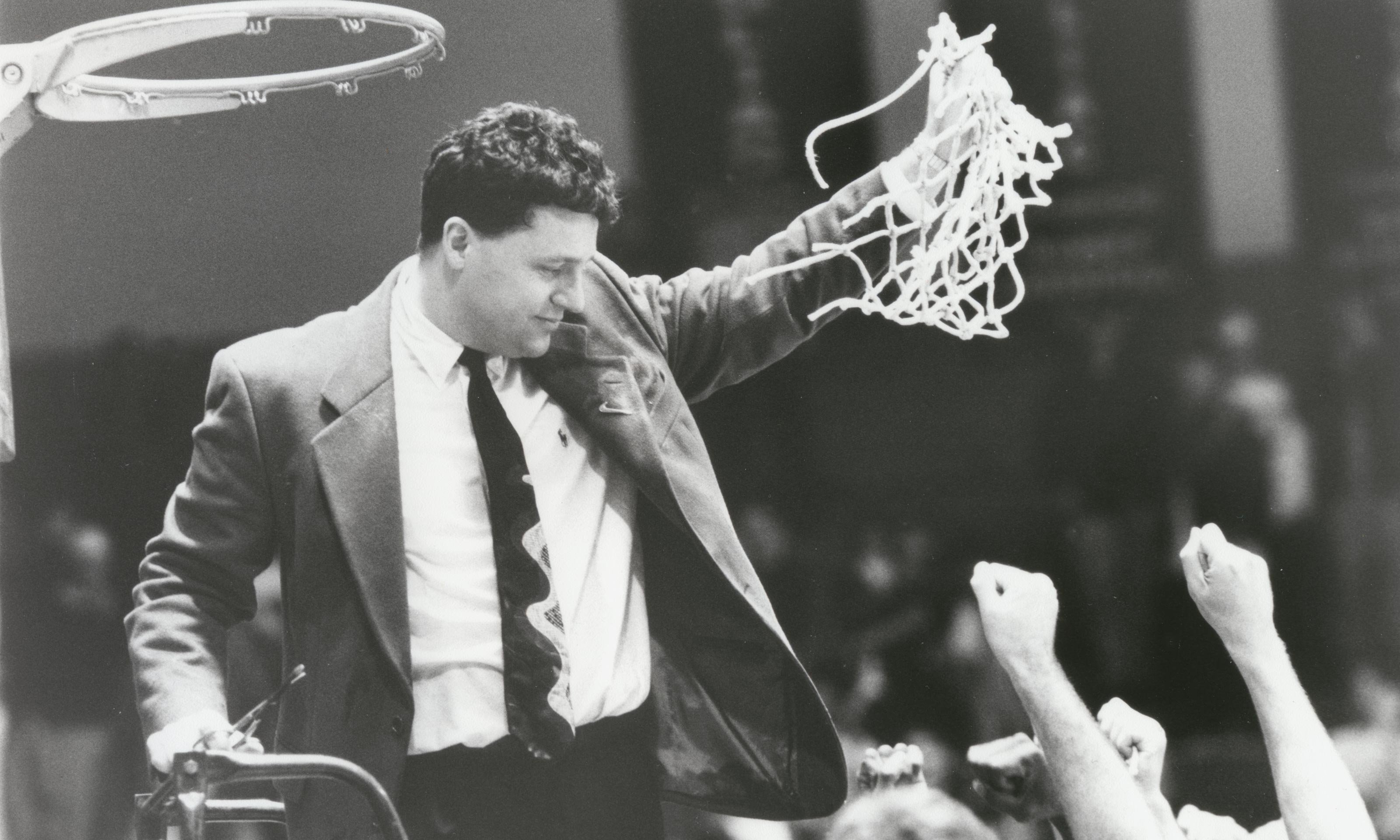
A younger Coach Greg Kampe, circa February 1996, after the Oakland University Golden Grizzlies (then Pioneers) won a share of the regular season GLIAC title. Photo courtesy of University Archives.
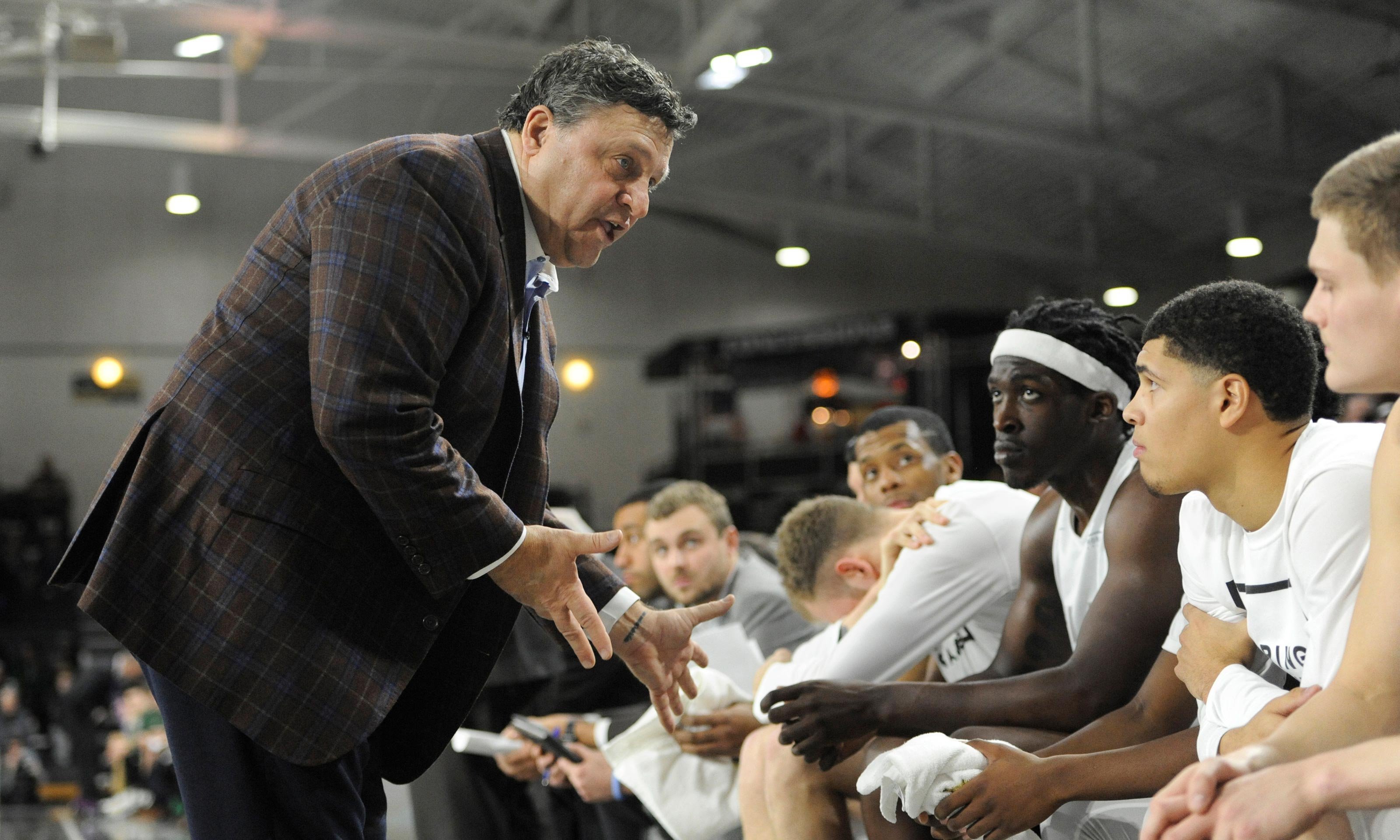
Oakland University head coach Greg Kampe on the court with the Golden Grizzlies. Photo by Jose Juarez.
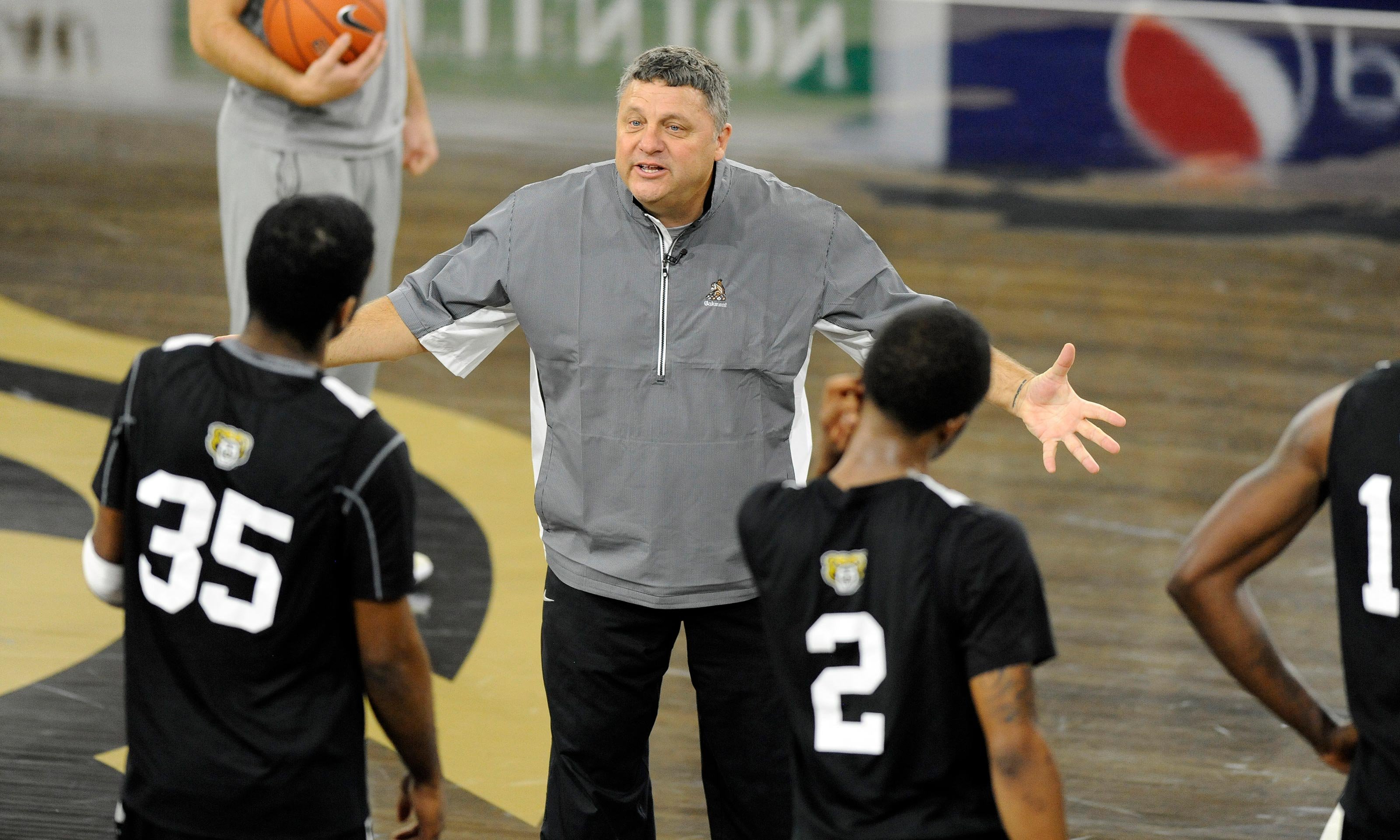
Oakland University head coach Greg Kampe in action on the court with the Golden Grizzlies. Photo by Jose Juarez.
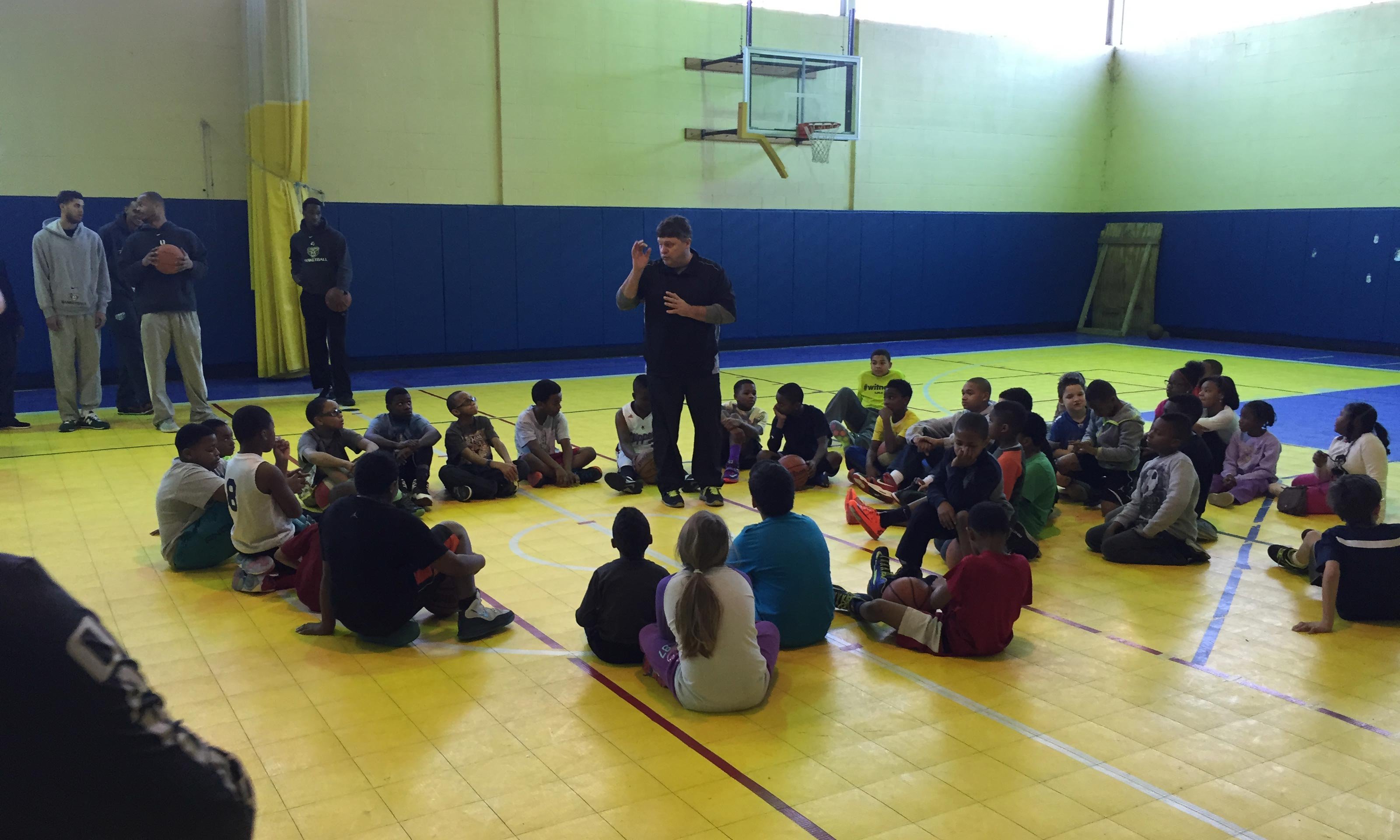
Oakland University head coach Greg Kampe speaking to elementary kids about basketball. Photo courtesy of Oakland University Athletics.
In his college years at Bowling Green State University, Kampe played football and basketball. "I was a better football player than I was a basketball player," he says. He spent six seasons as an assistant coach at the University of Toledo before coming to OU in 1984. He wanted to coach basketball because he knew he could form a closer bond with the players, rather than coaching more than 100 players on a football team. "So I wanted to coach basketball because there's only 10 to 15 players, and I believed that I could have a personal one-on-one relationship with each player better than a football coach does."
At Oakland, Kampe saw the opportunity to make a difference as a coach while being a father to his three boys.
"Being a coach here allowed me the autonomy to coach (my kids) in their little league baseball. Whereas, if I were a coaching a Big Ten Conference team, my job wouldn't allow that to happen," says Kampe. "So those, my family, my kids were very important to me. And I was going to be a dad. And I tried to mix that together. And I think one of the reasons I stayed at Oakland was because I could do it here."
Scoring two major wins, one against the University of Wisconsin- Green Bay and another against the University of Wisconsin-Milwaukee, the Golden Grizzlies turned around their season in the 11th hour.
"When we lost our five games, everyone counted us out," says Scott MacDonald, associate athletic director for public relations. "Coach Kampe told the team, take care of your job, believe in the process, and we will be there at the end. For this team to win nine straight games to end the season, and capture its first-ever Horizon League regular season championship in just its fourth season in the conference, is quite the feat."
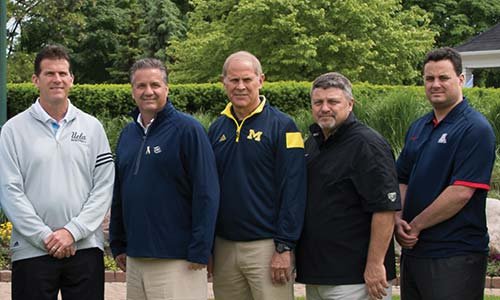 Coach Greg Kampe invites basketball coaches from around the country to help fight cancer at his Coaches Beat Cancer golf fundraiser. |
MacDonald first met Kampe in 1999 when he was hired as a graduate assistant in the sports information office. He was working at Georgia Tech when former Oakland athletic director Tracy Huth asked him to come back to lead the Athletic Communications office in 2007. "His dedication to this program and the success he has achieved is unmatched, and he truly believes that earning a degree is just as important as winning a championship," says MacDonald. "One of Coach Kampe's favorite quotes is, 'Consistency is the hallmark of greatness.' He uses that as he builds his program. If you do the right things in the classroom, during the offseason and in the community, you will excel on the court."
Kampe works year-round. This summer, in between hosting his own cancer awareness event and participating in other events across the country, Kampe will use his few weeks of downtime to decompress.
"I spend a lot of time with myself. I like to smoke a good cigar," he says. But feeling like your job is never finished comes with the territory as head coach.
"You can always get better and there is always more that you can do. But I believe it's about a culture. And I really like the culture of our program," he says. "I think in 33 years, we've changed, we've changed with the times. But the core of our culture is still about becoming the best student, the best player and the best person you can become. And we strive every day for that."
Before passing the ball to a new head coach, Kampe says there are still a couple things left for him to accomplish.
"First, is to get a number next to our name, to be nationally ranked one through 25. I don't care if it's 25. I want a number next to our name. And the second thing is to get to the second week of the NCAA tournament," he says. "I think if those two things can get done, then I will gladly hand it over to the next guy."
Then again, it was nearly 30 years ago when Kampe last mentioned handing it over to the "next guy."


 June 6, 2017
June 6, 2017 By Emell Derra Adolphus
By Emell Derra Adolphus